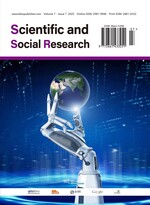Abstract
Telecom and online scams pose a global challenge. Despite intensified crackdowns worldwide, emerging technologies like AI have spawned novel tactics that threaten public safety. Grounded in multidisciplinary theoretical frameworks, this study analyzes victims’ susceptibility profiles across cognitive, behavioral, emotional, needs-based, and personality dimensions, demonstrating that vulnerability transcends specific demographics. The paper deconstructs how scammers exploit universal human weaknesses through stage-based psychological manipulation tactics. Finally, the study proposes public self-protection strategies: enhancing cognitive awareness (knowledge reserves), strengthening needs management, and building psychological resilience (inner fortitude) to identify and resist scams, thereby mitigating losses.
References
Zhuang H, Ma ZH, 2025, Failure and Optimization of Telecom and Online Fraud Intelligence Warning. Journal of Intelligence, 44(2): 116–123.
Zhang H, Jiang Y, 2023, Victimization Causes and Countermeasures of Telecom Fraud from Criminological Perspectives. Journal of Bohai University (Philosophy and Social Science Edition), 45(3): 38–41.
Xia YW, 2025, Patterns and Causes of Repeated Fraud Victimization among Elderly Population: An Empirical Analysis Based on Over 10000 Samples. Journal of Shandong University (Philosophy and Social Sciences Edition), 2025(2): 76–90.
He Q, Shen JR, 2020, Fraud Vulnerability of the Elderly: Concept, Theories, and Measurements. Chinese Journal of Applied Psychology, 26(3): 208–218.
Tian L, Qian H, 2023, Psychological Susceptibility Profiles and Countermeasure Pathways of Undergraduate Victims in Telecom Scam Incidents. West Academic Journal, 2023(11): 131–134.
Wang J, Qian XY, 2021, A Meta-Analysis on the Relation Between Self-Control and Fraud Vulnerability. Proceedings of the 23rd National Conference of Psychology: Abstracts (Volume II), 705–706.
Whitty TM, 2019, Predicting Susceptibility to Cyber-fraud Victimhood. Journal of Financial Crime, 26(1): 277–292.
Cross C, Kelly M, 2016, The Problem of “White Noise”: Examining Current Prevention Approaches to Online Fraud. Journal of Financial Crime, 23(4): 806–818.
Zhang WS, Xie ZW, 2024, Re-exploring the Definition of Hypnosis: A Kind of Profound Influence Characterized by Trance. Psychology Monthly, 19(9): 221–224 + 228.
